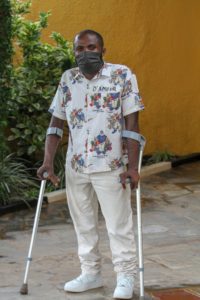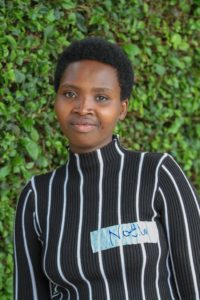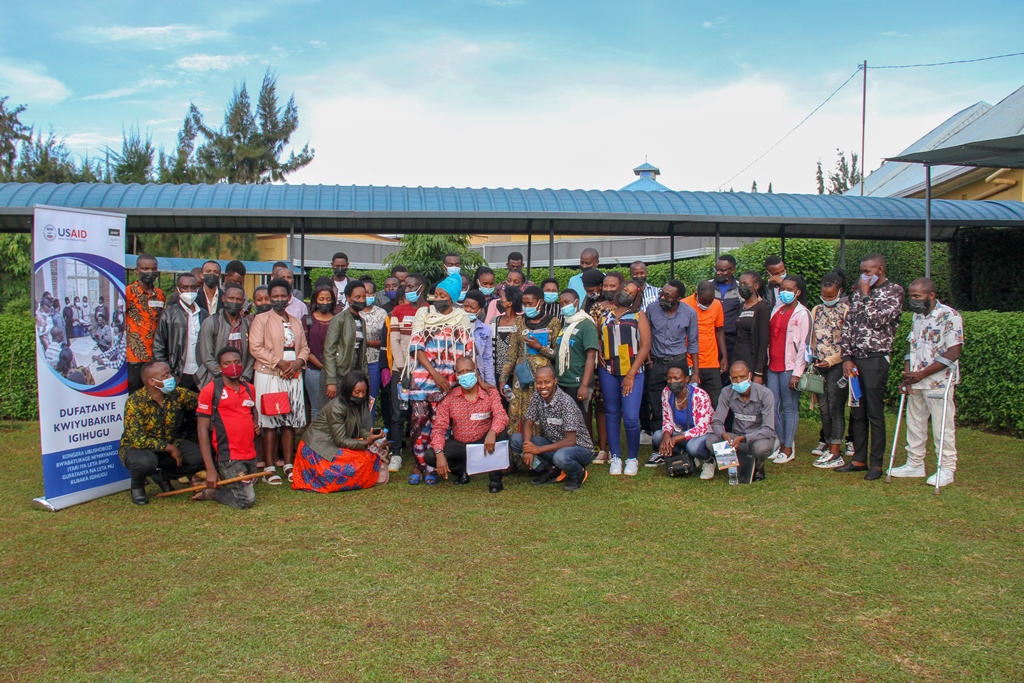Equipping young people with the knowledge and skills to participate in decision-making processes is a fundamental aspect of building their capacity to build and sustain peaceful societies. There are many ups and downs to this journey that require tackling various challenges, such as, social exclusion, lack of skills and confidence, teenage/unwanted pregnancies and extreme poverty. In response to some of these challenges, Never Again Rwanda with the support of USAID-Rwanda, are implementing “Dufatanye Kwiyubakira Igihugu”, a three-year citizen participation forum, with the goal of tackling issues hindering youth participation. This three-year intervention program will and is operating in eight districts (five per sector) these include: Huye, Nyanza, Kayonza, Nyagatare, Ngororero, Rusizi, Musanze and Burera.
In 2021, we officially began the implementation of the “Dufatanye Kwiyubakira Igihugu” (DKI) program. In launching, NAR’s Executive Director, Dr. Joseph Ryarasa Nkurunziza noted and emphasized that, “Based on various studies, it is clear that there is a gap in citizen participation, especially in the decision-making process. We are introducing this program to ensure that there are active steps being taken in bridging this gap and essentially playing a pivotal role in policy development and civic participation.”
During the training for young leaders in Kayonza District, youth champions from diverse backgrounds outlined their experiences and expectations regarding this project. Some of these include building knowledge, their networks, and raising the voice of the youth in the decision-making processes. One of the participants, Noella Ngiruwonsanga highlighted that, “Some young people, especially girls, are prone to poverty that may lead them into various toxic temptations. We have formed youth groups with the hope that the knowledge from these groups will expand into brilliant activities to empower the youth.” From Noella’s insights, it was evident that the youth had a zeal to be more involved in creating an enjoyable society for them to thrive in.
In seeing the youth take charge and create opportunities for themselves, Scovia Uwimana, clearly depicts the impact of these spaces. Prior to joining these groups, Scovia shied away from being around her peers due to bullying and stereotypes, in addition to this harsh poverty left her unable to further her studies and care for her child who was a result of an unwanted pregnancy at a young age. Now, Scovia is a youth leader representing “Abasangwabutaka”, “It is amazing that I am now sitting down with youth leaders from our district, to discuss solutions to ongoing problems in our society,” said Scovia. The impact in Scovia’s story is one that depicts that programs such as DKI are not only enriching their knowledge and skills but also their personal perception and growth.


One of the key pillars the DKI program stands on is diversity and inclusion, this means the inclusion of various groups of people particularly those representing vulnerable groups of people. Jean D’Amour Byumvuhore is a youth leader representing the disabled youths of Kabarondo sector. Jean D’Amour shared his burden of growing in a society that did not entrust him with equal opportunities. Though no one wanted to place their belief in him, he believed in himself which led to him becoming one of the most recognized barbers in his community. “This is a great opportunity for young people from all walks of life in our district to have a platform like this. From here, I am not growing myself but I am ready to tell my peers living with disabilities to not be afraid but to push them to work for the change they wish to see. “
The “Dufatanye Kwiyubakira Igihugu” program is a clear depiction of the work that needs to be done and is being done, but even more so it is an avenue for us as a society to tap into the youth’s potential. As we prepare for the future and mold our future leaders, we must start acting now. The training under the DKI program is an enriching opportunity to learn, network, grow, and harness our skills and talent into building an equitable and enjoyable society for all.


